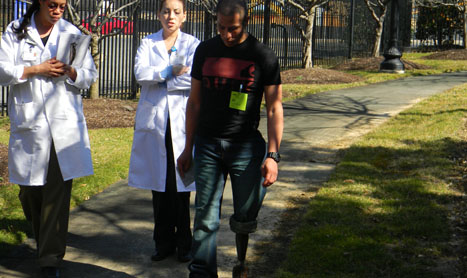WASHINGTON – Sitting in the garden of a local hospital, Carlos Felipa Cordova said that after explosions lifted him off his feet and slammed him to the ground, he reached for his Galil assault rifle and stood to fire on Shining Path guerillas hidden in the dense Peruvian jungle.
“I fell down,” he said through a translator, recalling that day in 2010. “Then, I looked down and my leg was gone.”
He pointed to his other leg and motioned with his hands that it was open, fileted by shrapnel. His left arm was also splayed, immobilized by splintered mine fragments.
Tuesday, Cordova, 30, from Lima, Peru, heads home with a new left leg: the Genium Bionic Prosthetic System, manufactured by Ottobock Healthcare and customized to fit him by Nascott, an Elkridge Orthotics and Prosthetics company.
Now that the Peruvian military has paid for his Genium Knee, Cordova’s goal is to hurl it, along with himself, out of an airplane.
“Oh, wow,” said Nascott Prosthetist Erin King with raised eyebrows and laughter, recalling her initial reaction. King works in Nascott’s facility inside National Rehabilitation Hospital in Washington.
King said Cordova can change functions manually by bouncing on the prosthetic toe: two for bicycling, three – skydiving.
Skydiving was a function Cordova specifically requested.

Before he lost his leg, one of his military roles was skydiving instructor. With his new leg, he will be able to walk naturally, foot over foot, as he lands.
The Genium Knee is a microprocessor-controlled knee joint that allows users to change functions, manually, or with a Bluetooth-activated remote control.
Its accelerometer measures changing speed and direction of movement, while its gyroscope tells where the user’s leg is in space. The technology is similar to that of smartphones and tablets, which react to a user’s movement and adjust a screen’s orientation.
With Nascott Certified Orthotic Fitter Dora A. Cortez translating, Cordova explained his only concern about returning to his role as skydiving instructor.
“I think it will be the same sensation. But I am just worried about losing the leg in the air,” Cordova said with a smile, eliciting laughter from King and Cortez.
King said she fitted Cordova with a special belt to ensure that won’t happen.
Cordova said he hopes returning to his duties inspires fellow soldiers who have lost limbs.
“I am not thinking of trying,” he said. “I will do it.”
Cordova is a member of the Rangers Battalion No. 19 “Commander Espinar” of the Peruvian Army Special Forces. He lost the leg when he and his men were ambushed by Shining Path, an insurgent group in Peru.

Cordova described the battle that cost him his leg in such vivid detail that before Cortez translated, she blurted, “I feel like I was just watching a movie.”
Cordova and 14 other soldiers had been on patrol for 18 days in the Peruvian jungle when, on Nov. 23, 2010, they descended into a valley with a clearing that made them vulnerable to ambush.
Traveling single file about one meter apart, Cordova, the second man in line, radioed for his men to expand the distance between each to 7 meters, a distance he thought would make them more secure.
The scene unfolded in slow motion, he said. He heard Shining Path insurgents rustling in the foliage.
When the first landmine detonated, Cordova said he was thrown into the air. The explosion immediately set off four other mines, but the order to spread out, he thinks, saved lives.
“That is why I have peace,” Cordova said. “Because everyone would have died.”
Two of his men died in the fighting and several were wounded.
Cordova said the combination of dense jungle and heavy fire kept rescue helicopters from retrieving his men. So their only recourse was to move on foot, non-stop, day and night.
The fighting began around 2 pm and Cordova said they were not rescued until 5 pm the next day.
Doctors immediately amputated his left leg.
They were able to surgically reconstruct his right leg with surgeries, skin grafts, tendons from a cadaver and a knee replacement.
His memories are so sharp, he said, because he was conscious throughout the entire mission.
During his recovery, his comrades and family worried about him accepting the loss of his leg.
“I accepted it as soon as it happened. I lost my leg, I lost my leg,” he said with a shrug. “There was nothing I could do about it.”
He spent about seven weeks in intensive care and about nine months recovering from the reconstruction on his right leg, even suffering an infection.
For someone highly trained in military maneuvers, adjustment was not easy.
“Having to walk with crutches,” he said, “was like being chained to something.”
He was offered an administrative job but declined.
“You might as well send me away,” he said to the offer. “I wanted to someday become a general. I want to be in charge of missions.”
He said he also wants to run again, to which prosthetist King interjected with a smile, “Patience.”
It was a word, along with “slow down,” uttered a few times when Cordova was walking in the hospital’s Therapeutic Garden, an outdoor setting with stairs and walking paths.
The capture of Shining Path leader, Comrade Artemio, whose given name is Florindo “Jose” Flores, was reported by the Associated Press earlier this month.
Cordova wants to get home to celebrate.
“That’s why I was in a hurry,” Cordova said, using two fingers on the table to simulate walking.
“I am so proud,” he said. “Proud of the scars I have.”
Then he lifted up his right-shoulder sleeve, revealing a tattoo symbolizing his special forces division. It is a helmet-clad soldier with a feather on his forehead that Cordova says represents leadership.
“It’s not just a tattoo,” he said in English. “It’s who I am.”


You must be logged in to post a comment.